(完整版)高考情态动词与虚拟语气考点
高中英语关于情态动词和虚拟语气的知识点总结

关于情态动词和虚拟语气的知识点总结【考纲解读】1、准确把握情态动词表允许、推测、判断等用法;2、准确把握情态动词在虚拟语气句子结构中的使用;3、wish,as/though,if only,would rather+从句,It is time+从句等句型中的虚拟语气;4、表示“坚持、命令、建议、要求”的词语后及各类从句中的虚拟语气;5、虚拟语气在非真实条件句中的运用。
【知识点梳理】情态动词表示说话人的语气和情绪,本身词义不全,不能单独作谓语,后面必须与动词原形一起构成谓语。
情态动词没有人称和数的变化,有的情态动词有过去式。
常见的情态动词有can, could, may, might, must, have to, shall, should, will, would, ought to, need, dare等。
一、情态动词的基本用法和重点点击(一)can和could基本用法1.表示体力或脑力(知识、技能)所产生的能力。
He could read books in English when he was only five.他只有五岁的时候就会读英文书籍了。
2.表示客观的可能性Anybody can make mistakes.任何一个人都有可能犯错误。
3.表示请求建议,用could 比 can语气更委婉 (回答用原形)Could you be here at eight o’clock tomorrow morning?你可不可以明天上午8点钟来这儿呢?4.表示允许、许可,用could 比 can更委婉客气。
Could/Can I borrow your reference books?我可以借用一下你的参考书吗?重点点击1.否定句、疑问句和感叹句中,表示怀疑、惊异、不相信的态度。
Can it be true? 难道这是真的?You can't be serious! 你怕不是在开玩笑吧!Oh, dear, what on earth can this mean? 哎呀,亲爱的,这究竟是意味着什么?2.表示“经过努力后终于能……”用be able toThe fire spread the building quickly but everybody was able to escape.大火迅速蔓延到整幢大楼,但大家都逃了出来。
高考英语复习知识点:情态动词和虚拟语气及英语作文结尾万能公式

高考英语复习知识点:情态动词和虚拟语气及英语作文结尾万能公式高考英语复习知识点:情态动词和虚拟语气虚拟语气在高考命题中不是重点,但是难点。
考点常集中在含蓄条件句以及主语、宾语从句等特定句型中虚拟语气的使用上,因此考生应熟练掌握含蓄条件句中主从句的时态要求以及一些典型句型中虚拟语气的具体形式。
虚拟语气考点透析考点一、虚拟语气的基本用法1.与现在事实相反的虚拟语气,基本结构为:主语+动词的一般过去时(be动词用were)+其他成分+if+should/would/could...+动词原形+其他成分。
例如:①If it were not for the fact that she ______ sing,I would invite her to the party.A.couldntB.shouldntC.cantD.might not解析句意为:如果不是因为她不会唱歌的事实,我会邀请她来参加那次聚会的。
that从句为同位语从句,描述的是事实,用陈述语气。
正确答案为C。
2.与过去事实相反的虚拟语气,基本结构为:主语+动词的过去完成时+其他成分+if+should/would/could...+have done+其他成分。
例如:If the weather had been better,we could have had a picnic.But it ______ all day.A.rainedB.rainsC.has rainedD.is raining解析句意为:如果天气好的话,我们是能够去野餐的,但是下了一天的雨。
句子前半部分陈述的是与过去事实相反的事情,所以用了虚拟语气。
下了一天的雨是事实,所以用陈述语气。
因为是发生在过去的事实,所以正确答案为A。
3.与将来事实相反的虚拟语气,基本结构为:主语+动词的一般过去时/should do/were to do+其他成分+if+should/would/could...+动词原形+其他成分。
高考英语情态动词和虚拟语气复习(完整版)

高考英语情态动词和虚拟语气复习【名师精讲必考语法,值得下载练习】情态动词是一种本身有一定的词义,后面加动词原形,给谓语动词增添情感色彩,表示说话人对有关行为或事物的态度和看法,认为其可能、应该或必要等。
一、情态动词的分类1.只做情态动词:must, can(could), may(might), ought to, should2.可做情态动词又可做实意动词:need, dare(dared)3.可做情态动词又可作助动词:shall, will(would)4.具有情态动词特征:have(had) to, used to, had better (not) do二、情态动词的特点1.情态动词没有人称和数的变化。
2. 情态动词后跟动词原形,否定式构成是在情态动词后面加“not”。
3. 情态动词属非及物动词,故没有被动语态。
三、情态动词的基本用法1.can/ could1) 表示能力Can you lift this heavy box?Mary can speak English fluently.此时可用be able to 代替。
can 只有一般现在时和一般过去式;而be able to 则有更多的时态。
I’ll be able to come this afternoon.注意:当表示“经过努力而成功做到某事时”不能用could, 而用was/were able to do= succeeded in doing= managedto doHe was able to go to the party yesterday in spite of the heavy rain.2) 表示可观可能性(客观原因形成的能力)。
译为“能够;可以”This hall can hold 500people at least.3) 某人或某物一时的可能性,常译为“有时(可能)会”It is usually warm in my hometown in March, but it can be rather cold sometimes.Little children can be very naughty.4) 表示请求和允许----- Can I go now?----- Yes, you can. No, you can’t.此时可与may 互换。
高考 情态动词和虚拟语气 知识点总结

情态动词和虚拟语气一、情态动词的用法要点1.表能力CanBe able to 表现在的能力Will be able to 表将来的能量力CouldWas/were able to 表过去的能力Could have + 过去分词表过去有能力但未做2.表推测(可能性)a.可能性分为客观的可能性和具体事情实际发生的可能性两种。
所谓客观的(理论的)可能性即并不涉及具体某事是否会发生,此种用法常常可以说明人或事物的特征情态动词can可用于肯定句中表示可观的(理论的)可能性,而表示具体事情实际发生的可能性时,can一般不用于肯定句。
b.表示具体事情实际发生的可能性①表示集体事情实际发生的可能性层次比较②表示具体事情实际发生的可能性时,may, must常用于肯定句,一般不用于否定句和疑问句(may not表示“可能不”);can常用于否定句、疑问句或感叹句中,表示疑惑、惊讶或不相信等意思;could既可用于肯定句又可用于否定句、疑问句中。
③would, could, should, might并不一定与过去时间有关,而表示可能性弱于他们相应的现在时形式④should表推测时,表示确定或可能有的未来或期望,即合乎理想的情况或结果3.表示请求、允许、允诺a.当对方是决策者时,你代表你(们)自己(I, we),或代表第三者(he, she, they)向对方(you)请示或提出建议时用:①shall/may(might)/can(could) I/we…?②shall he/she/they…?③would/will you…?b.Could/might/would/should表委婉语气c.Shall与第二、三人称连用用于陈述句,表示说话者的命令、警告、威胁;当宣布法律规定时,shall也由此用法4.表必要性a.must常用来表示必要性,以为“必须”①must + do sth. (现在或将来)必须做某事②don’t have to do sth./don’t need to do sth./needn’t do sth.(现在或将来)不必做某事③表示过去没必要做某事,分以下情况:Needn’t have done sth.本来不必做而做了某事Didn’t have to do sth./didn’t need to do sth./It was not necessary to so sth.(过去)不必做(不强调是否做了)某事b.should也可以表示必要性,意为“(义务上)应该”。
高三英语一轮语法复习情态动词和虚拟语气课件

1. 对现在或将来的推测(结构:情态动词+do) 情态动词可以用来表示对现在或将来的情况进行推测 She could be lost. 她可能迷路了。 注意 如果是对现在或未来正在发生的事情进行推测,可以使用“情 态动词+be doing”结构。 My friend may be still sleeping at home now. 我的朋友现在可能正在家里睡觉。
(2)表示推测,表示“肯定,一定”之意,此时,must只用于肯定句。在否定句 或疑问句中,用can / could。
(3)表示“偏偏,非要,硬要”,有时表示不巧,有时表示固执,
通常都是指令人不快的事。
4. shall的用法
(1)用于第二、三人称,表示说话人的命令、警告、强制、允诺、威胁或 决心等。
考点3 “情态动词+have done”表示责备的语气
可用于表责备语气的情态动词有:should, ought to, could, might, need等,它们常被用来表示说话人对过去事情的不满或遗憾,带 有较强 烈的责备语气,其结构为“情态动词+have done”。
1. should(ought to)have done“本应该……” 表示过去应该做而(实际)没有做的事情,含有责备或遗憾的语 气,其否定形式为“should not/ought not to have done”。should have done 还可以用来表示惊讶、赞叹等情绪 2. could/might have done “本来能够(会)……” 表示过去本来能够(可以)做某事,但实际上没有做到。 3. need+have+done “原本需要做……” 表示本来需要做某事而没有做,“needn’t+have+done”则表示“本来 不必做某事而做了”。
高中英语:情态动词与虚拟语气语法知识点
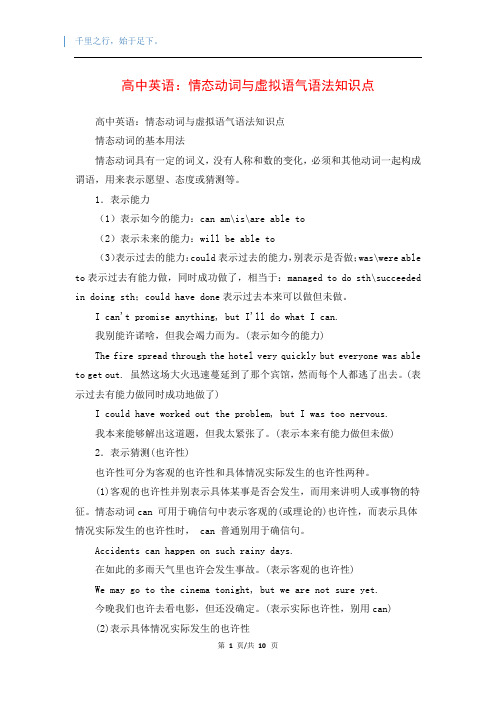
高中英语:情态动词与虚拟语气语法知识点高中英语:情态动词与虚拟语气语法知识点情态动词的基本用法情态动词具有一定的词义,没有人称和数的变化,必须和其他动词一起构成谓语,用来表示愿望、态度或猜测等。
1.表示能力(1)表示如今的能力:can am\is\are able to(2)表示未来的能力:will be able to(3)表示过去的能力:could表示过去的能力,别表示是否做;was\were able to表示过去有能力做,同时成功做了,相当于:managed to do sth\succeeded in doing sth;could have done表示过去本来可以做但未做。
I can't promise anything, but I'll do what I can.我别能许诺啥,但我会竭力而为。
(表示如今的能力)The fire spread through the hotel very quickly but everyone was able to get out. 虽然这场大火迅速蔓延到了那个宾馆,然而每个人都逃了出去。
(表示过去有能力做同时成功地做了)I could have worked out the problem, but I was too nervous.我本来能够解出这道题,但我太紧张了。
(表示本来有能力做但未做)2.表示猜测(也许性)也许性可分为客观的也许性和具体情况实际发生的也许性两种。
(1)客观的也许性并别表示具体某事是否会发生,而用来讲明人或事物的特征。
情态动词can 可用于确信句中表示客观的(或理论的)也许性,而表示具体情况实际发生的也许性时, can 普通别用于确信句。
Accidents can happen on such rainy days.在如此的多雨天气里也许会发生事故。
(表示客观的也许性)We may go to the cinema tonight, but we are not sure yet.今晚我们也许去看电影,但还没确定。
高考英语二轮复习情态动词和虚拟语气考点讲解含解析
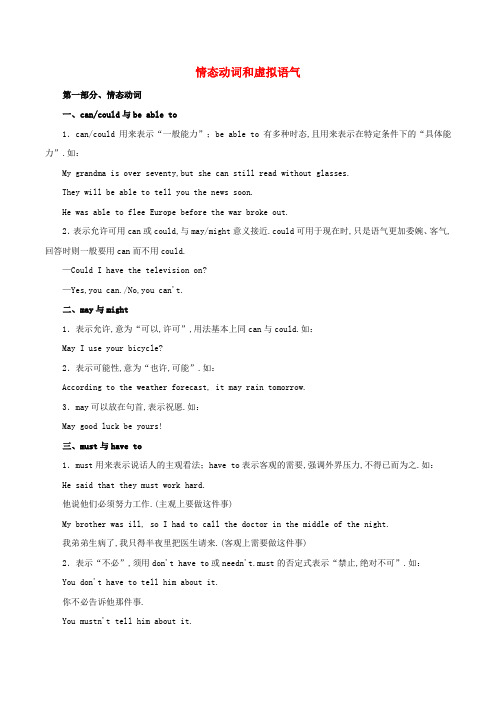
情态动词和虚拟语气第一部分、情态动词一、can/could与be able to1.can/could用来表示“一般能力”;be able to有多种时态,且用来表示在特定条件下的“具体能力”.如:My grandma is over seventy,but she can still read without glasses.They will be able to tell you the news soon.He was able to flee Europe before the war broke out.2.表示允许可用can或could,与may/might意义接近.could可用于现在时,只是语气更加委婉、客气,回答时则一般要用can而不用could.—Could I have the television on?—Yes,you can./No,you can't.二、may与might1.表示允许,意为“可以,许可”,用法基本上同can与could.如:May I use your bicycle?2.表示可能性,意为“也许,可能”.如:According to the weather forecast, it may rain tomorrow.3.may可以放在句首,表示祝愿.如:May good luck be yours!三、must与have to1.must用来表示说话人的主观看法;have to表示客观的需要,强调外界压力,不得已而为之.如:He said that they must work hard.他说他们必须努力工作.(主观上要做这件事)My brother was ill, so I had to call the doctor in the middle of the night.我弟弟生病了,我只得半夜里把医生请来.(客观上需要做这件事)2.表示“不必”,须用don't have to或needn't.must的否定式表示“禁止,绝对不可”.如:You don't have to tell him about it.你不必告诉他那件事.You mustn't tell him about it.你绝不能告诉他那件事.—Must we do it now?我们必须现在做吗?—No, you needn't.不,你们不必.四、shall1.用于第一、第三人称的疑问句中,用来征求对方的意见或请求指示.如:What shall he do next?他下一步干什么呢?2.用于第二、第三人称的陈述句中,表示说话人的意愿,有“命令、警告、允诺、威胁、强制”等意思.如:He shall stay in bed.他必须躺在床上.You shall have it back next week.下周一定还你.He says he won't go, but I say he shall.他说他不去,但我说他必须去.五、will与would1.will用于各种人称,表示“意志、意愿”或“决心”等.如:If you will keep your watch half an hour slow, it is hardly surprising that you are late for your appointments.如果你想要让你的表慢半个小时,你约会时迟到就不足为怪了.2.will表示习惯性的动作,有“总是,惯于”的含义.如:An Englishman will usually show you the way in the street.英国人通常是会在街上给你指路的.3.would可表示过去反复发生的动作.如:On Sundays he would get up early and go fishing.星期天他总是早起去钓鱼.六、should与ought to1.should表示“建议”或“劝告”,有“应该”之意.如:You should learn from each other.2.ought to表示根据某种义务或必要“应当”做某事.如:Everyone ought to obey the traffic regulations.3.should和ought to也可用来表示推测,意为“想必会……”.如:—When can I come for the photos? I need them tomorrow afternoon.—They should be ready by 1200.七、情态动词表示推测1.can用于肯定句中表示客观的可能性,意为“有时会”;用于疑问句中可以表示推测,意为“可能”,有时表示一种惊讶的语气;用于否定句中也可以表示推测,can't意为“不可能”,语气很强烈.It is usually warm in my hometown in March, but it can be rather cold sometimes.我的家乡在三月份通常很暖和,但有时候也会相当冷.Mr. Bush is on time for everything. How can it be that he was late for the meeting?布什先生做什么事情都很准时,他怎么可能开会迟到呢?—Let's visit Tom together, Stephen.—There's no need to do so. He can't be at home, because I saw him board the flight to Beijing this morning.——Stephen,咱们一起拜访汤姆吧.——没必要这样做.他一定不在家,因为今天早晨我看见他登上了飞往北京的航班.2.may/might用于肯定句中可以用来表示不十分肯定的推测,意为“有可能”;用于否定句中也可以表示推测,may not意为“可能不”,表示一种不太确定的语气.The traffic is heavy these days. I might arrive a bit late, so could you save me a place?这些天交通很繁忙,我可能会来晚一点,请你帮我保留个位置好吗?3.must表示推测时只能用于肯定句中,意为“一定,必定”,表示十分肯定的语气(在疑问句中或否定句中要用can/could).—It's the office! So you must know eating is not allowed here.—Oh, sorry.——这是办公室!所以你一定知道这里不许吃东西.——噢,对不起.4.should用来表示推测时意为“应该”,即含有“按道理来说应当如此”的意思.There shouldn't be any difficulty about passing the road test since you have practiced a lotin the driving school.因为你在驾校训练了这么多,通过路考应该没什么困难.八、“情态动词+have done”结构1.should/ought to+have done,表示“过去本应该做而(实际)没有做的事情”,含有责备或遗憾的语气,意为“本应该……”.其否定形式为“should not/ought not to have+done”,表示某种行为本不该发生但实际上发生了.I shouldn't have watched that movie—it'll give me horrible dreams.我本不应该看那部电影——它会令我做噩梦.You ought to have come to the party yesterday, but why didn't you come?昨天你本来应该参加聚会的,可是你为什么不来?2.must+have done,用于肯定句,表示“过去一定做过某事”,表示一种很有把握的推测.注意,对过去发生的情况的否定推测常用“can't/couldn't+have done”表示.—Ye Shiwen won two gold medals in London Olympic Games.—She must have gone through tough training.——叶诗文在伦敦奥运会获得了两枚金牌.——她肯定受到严格的训练.—Do you know where David is? I couldn't find him anywhere.—Well. He can't have gone far—his coat's still here.——你知道大卫在哪里吗?我到处找不到他.——大卫的上衣还在这里,因此他肯定没走远.3.needn't+have done,表示“过去没有必要做某事,但实际上做了某事”.Mark needn't have hurried. After driving at top speed, he arrived half an hour early.马克本没必要那么匆忙.他以最快速度开车,结果早到了半个小时.4.may/might+have done,表示对过去情况的一种不太有把握的可能性的推测,表示“可能已做了某事……”,否定句表示“可能还没有……”.Sorry, I'm late. I might have turned off the alarm clock and gone back to sleep again.对不起,我迟到了.我可能把闹钟关掉后又睡着了.5.could+have done表示“过去本来可以做某事,但实际上没有做”;can/could+have done表示“过去可能做了某件事”.I could have saved the poor rabbit, but I didn't have the right drugs with me at that moment.我本来可以拯救那只可怜的兔子的,可是我当时没有合适的药品.第二部分、虚拟语气一、虚拟语气在虚拟条件句中的用法1.在具体运用中,条件从句中有时可省略if而采用倒装结构.如:Had it not been for your help, we wouldn't have achieved so much.2.介词without/but for、连词but、副词otherwise常用来表示某种假设条件.如:I wouldn't have made such rapid progress without your help.3.有时候从句动作和主句动作发生的时间不一致,这时谓语动词的形式要根据各自的时间来调整.如:If the weather had been more favourable, the crops would be growing still better.二、“should+动词原形”表示的虚拟语气这一类型常见词有“一坚持(insist)、二命令(order, command)、三建议(advise, suggest, propose)、四要求(request, require, demand, desire)”.以上词及其派生名词所接的名词性从句都使用“(should +)动词原形”的虚拟语气.①Jane's pale face suggested that she was ill, and her mother suggested that she(should) havea medical examination.简苍白的脸色表明她病了,她母亲建议她去检查身体.②She insisted that the man had stolen her car and that he(should) be sent to prison.她坚持说那个男人偷了她的车,并坚决要求他坐牢.三、特殊句式中的虚拟语气If only/It's (high) time (that)...wish/would rather/as if等固定句式要求用相应的虚拟语气表达形式.①I wish I could fly.真希望我能飞.②I would rather you came tomorrow.我宁愿你明天来.③If only I had taken your advice!要是听从了你的建议该多好啊!高频考点一、考查情态动词例1.(2018·北京卷)In today’s information age, the loss of data _________ cause serious problems for a company.A. needB. shouldC. canD. must【答案】C【解析】考查情态动词.句意:在今天的信息时代,数据的丢失有时会对一个公司造成严重的问题.数据丢失造成严重问题是客观上会发生的情况,即“客观可能性”,故该空应用情态动词can.C选项正确.其余情态动词均没有该用法.need需要;should应该,竟然;must必须,肯定.【变式探究】—Can’t you stay a little longer?—It’s getting late. I reall y _____go now, My daughter is home alone.A .mayB .canC . mustD .dare【答案】C【解析】句意:——你不能再多待会儿吗?——很晚了,我必须得走了.我女儿一个人在家.A. may可能,可以,也许;B. can能,会;C. must必须,必然要,必定会;D. dare敢,胆敢.结合句意,故选C.【变式探究】________ I have a word with you? It won’t take long.A. CanB. MustC. ShallD. Should【答案】A【解析】本题考察的是情态动词基本意义辨析.Can能够,可能;must必须,一定;非得;shall将要;should应该;句意:我可以和你谈谈吗?不会花很多时间的.根据句意可知本题使用can I…?表示询问对方是否允许.如:Can I use your dictionary?我可以使用你的字典吗?故A正确.高频考点二、考查情态动词的用法例2. (2018·天津卷) I can't find my purse. I___________ it in the supermarket yesterday, but I'm not sure.A. should leaveB. must have leftC. might leaveD. could have left【答案】D【解析】考查情态动词表推测.句意:我不能找到我的钱包了,昨天我有可能把它落到超市了,但我不确定.根据句中时间状语yesterday可知,是对过去事情的推测,故用情态动词+ have done,再根据后句but I’m not sure.可知,此推测为不能肯定的推测,故用情态动词could,表示“可能”.故选D.【变式探究】(2017•天津)My room is a mess, but I __________clean it before I go out tonight.I can do it in the morning.A. daren’tB. shouldn’tC. needn’tD. mustn’t【答案】C【解析】句意:我的房间很乱,但是在今晚我出去之前不需要打扫,我可以明天早晨再打扫.A.不敢;B.不应该;C不需要;D.不许.根据句意,故选C.【变式探究】Why didn't you tell me about your trouble last week?If you ________(tell)me,I could have helped.【答案】had told【解析】句意:上个星期你为什么不告诉我你的麻烦事?如果你告诉我了,我就能帮你.根据句意和相关信息判断,条件句表示与过去事实相反的假设,此时从句用过去完成时,主句谓语用“情态动词+have done”形式.【变式探究】I ______ have worried before I came to the new school, for my classmates here are very friendly to me.A. mightn’tB. mustn’tC. needn’tD. couldn’t【答案】C【解析】句意:我来新学校之前本没有必要担心,因为在这里我的同学对我非常友好.needn’t have done本没有必要做某事,表示实际上已经做了某事.根据句意可知选C.高频考点三、考查虚拟语气例3.(2019·天津卷)The workers were not better organized, otherwise they ________ the task in half the time.A.accomplished B.had accomplishedC.would accomplish D.would have accomplished【答案】D【解析】考查虚拟语气.句意:工人们没有被组织好,否则的话他们会用那一半的时间完成任务的.此处otherwise表达了一种含蓄虚拟;otherwise前的内容所述的是过去的事实,相当于if引导的条件状语从句“If the workers had been better organized”,因此后半部分应用“主语+would have done sth.”的结构.故选D.【举一反三】【2018·江苏】It’s strange that he _______have taken the books without the owner’s permission.A. wouldB. shouldC. couldD. might【答案】B【解析】考查虚拟语气.句意:真奇怪,他竟然没有主人的允许就拿走了这些书.在句型”It is important/necessary/strange/impossible/natural that...”中,其中由that引导的主语从句通常用“should+动词原形”这样的虚拟语气,其中的should可以省略.故选B.【变式探究】(2017·北京)If the new safety system _______ to use, the accident would never have happened.A. had been putB. were putC. should be putD. would be put【答案】A【解析】句意:如果这个新的安全系统被投入使用过的话,这个事故就不会发生了.根据主句确定是对过去情况的虚拟,所以从句谓语用had done形式,此外根据句意可知是被动,用被动语态,故A项是正确的.【变式探究】________(have)the governments and scientists not worked together,AIDSrelated deaths would not have fallen since their highest in 2005.【答案】Had【解析】句意:如果政府和科学家不共同努力,与艾滋病相关的死亡就不会从2005年的最高点下降.这是一个省略了从属连词if的虚拟语气句,使用了倒装句式.根据主句的would not have fallen可知,这里是表示过去的虚拟语气,所以用had.【变式探究】Without his wartime experiences, Hemingway____ his famous novel A Farewell to Arms.A.didn’t writeB. hadn’t writtenC. wouldn’t w riteD. wouldn’t have written【答案】D【解析】句意:没有他战时的经验,海明威就不可能写出著名的小说永别了武器.根据without his wartime experience没有战时的经历,可知表示对于过去的否定猜测,故主句用would have done,因此选D 项.1.(2019·天津卷)The workers were not better organized, otherwise they ________ the task in half the time.A.accomplished B.had accomplishedC.would accomplish D.would have accomplished【答案】D【解析】考查虚拟语气.句意:工人们没有被组织好,否则的话他们会用那一半的时间完成任务的.此处otherwise表达了一种含蓄虚拟;otherwise前的内容所述的是过去的事实,相当于if引导的条件状语从句“If the workers had been better organized”,因此后半部分应用“主语+would have done sth.”的结构.故选D.2.(2019·江苏卷)What a pity! You missed the sightseeing, or we ________ a good time together.A.had B.will haveC.would have had D.had had【答案】C【解析】考查虚拟语气.句意:多么遗憾!你错过了这次游览.否则,我们就可以一起度过一段愉快的时光.根据关键词or可知,这里表示与过去的事实相反,谓语动词应用would/could/should/might+have done.1.【2018·江苏】 There is a good social life in the village, and I wish I _______ a second chance to become more involved.A. hadB. will haveC. would have hadD. have had【答案】A【解析】考查虚拟语气.句意:在这个村里有很好的社交生活,并且我希望我再有机会去更多的参与.本题考查wish引导的宾语从句,表示与现在事实相反的愿望,所以从句用一般过去时.故选A.2.【2018·江苏】It’s strange that he _______have taken the books without the owner’s permission.A. wouldB. shouldC. couldD. might【答案】B【解析】考查虚拟语气.句意:真奇怪,他竟然没有主人的允许就拿走了这些书.在句型”It isimport ant/necessary/strange/impossible/natural that...”中,其中由that引导的主语从句通常用“should+动词原形”这样的虚拟语气,其中的should可以省略.故选B.3.(2018·天津卷) I can't find my purse. I___________ it in the supermarket yesterday, but I'm not sure.A. should leaveB. must have leftC. might leaveD. could have left【答案】D【解析】考查情态动词表推测.句意:我不能找到我的钱包了,昨天我有可能把它落到超市了,但我不确定.根据句中时间状语yesterday可知,是对过去事情的推测,故用情态动词+ have done,再根据后句but I’m not sure.可知,此推测为不能肯定的推测,故用情态动词could,表示“可能”.故选D.4.(2018·北京卷)In today’s information age, the loss of data _________ cause serious problems for a company.A. needB. shouldC. canD. must【答案】C【解析】考查情态动词.句意:在今天的信息时代,数据的丢失有时会对一个公司造成严重的问题.数据丢失造成严重问题是客观上会发生的情况,即“客观可能性”,故该空应用情态动词can.C选项正确.其余情态动词均没有该用法.need需要;should应该,竟然;must必须,肯定.5.(2018·北京卷)They might have found a better hotel if they _________ a few more kilometers.A. droveB. would driveC. were to driveD. had driven【答案】D【解析】考查虚拟语气.句意:如果他们多开几公里的话,他们也许会找到一个更好的旅馆.由“they might have found a better hotel”可知,该句是表示对过去的虚拟.if ____ a few more kilometers是条件句部分,表示对过去的虚拟,条件句部分要用过去完成时态,故D选项正确.1.(2017·北京)Samuel, the tallest boy in our class, ______ easily reach the books on the top shelf.A. mustB. shouldC. canD. need【答案】C【解析】A. must 必须 B. should 应该 C. can 能 D. need 需要.句意:Samuel,我班最高的男生,能很轻松地够着书架顶上的书,此处需要一个表示能力的词,故用can,答案为C.2.(2017•天津)My room is a mess, but I __________clean it before I go out tonight. I can do it in the morning.A. daren’tB. shouldn’tC. needn’tD. mustn’t【答案】C【解析】句意:我的房间很乱,但是在今晚我出去之前不需要打扫,我可以明天早晨再打扫.A.不敢;B.不应该;C不需要;D.不许.根据句意,故选C.3.(2017•江苏) _______ not for the support of the teachers, the student could not overcome her difficulty.A. It wereB. Were itC. It wasD. Was it【答案】B【解析】考查虚拟语气和倒装.虚拟语气中,be动词统一用were;虚拟语气的省略形式主要是把if省略,同时把were/should/had提前,即Were /Should/ Had I...,故选B.句意:要不是老师们的支持,该生是无法克服她自己的困难的.4.(2017·江苏卷) ____________ not for the support of the teachers, the student could not overcome her difficulty.A. It wereB. Were itC. It wasD. Was it【答案】B【解析】考查虚拟语气的省略.虚拟语气中,be动词统一用were;虚拟语气的省略形式主要是把if省略,同时把were/should/had提前,即Were /Should/ Had I...,故选B.5.(2017•江苏) _______ not for the support of the teachers, the student could not overcomeher difficulty.A. It wereB. Were itC. It wasD. Was it【答案】B【解析】考查虚拟语气和倒装.虚拟语气中,be动词统一用were;虚拟语气的省略形式主要是把if省略,同时把were/should/had提前,即Were /Should/ Had I...,故选B.句意:要不是老师们的支持,该生是无法克服她自己的困难的.6.(2017·北京)If the new safety system _______ to use, the accident would never have happened.A. had been putB. were putC. should be putD. would be put【答案】A【解析】句意:如果这个新的安全系统被投入使用过的话,这个事故就不会发生了.根据主句确定是对过去情况的虚拟,所以从句谓语用had done形式,此外根据句意可知是被动,用被动语态,故A项是正确的.1.(2016·浙江,15)________(have)the governments and scientists not worked together,AIDSrelated deaths would not have fallen since their highest in 2005.【答案】Had【解析】句意:如果政府和科学家不共同努力,与艾滋病相关的死亡就不会从2005年的最高点下降.这是一个省略了从属连词if的虚拟语气句,使用了倒装句式.根据主句的would not have fallen可知,这里是表示过去的虚拟语气,所以用had.2.(2016·浙江,17)George can't ________(go)too far.His coffee is still warm.【答案】have gone【解析】句意:乔治不可能走得太远了.他的咖啡仍然是温的.can't have done是对过去的否定推测.3.(2016·北京,34)Why didn't you tell me about your trouble last week?If you ________(tell)me,I could have helped.【答案】had told【解析】句意:上个星期你为什么不告诉我你的麻烦事?如果你告诉我了,我就能帮你.根据句意和相关信息判断,条件句表示与过去事实相反的假设,此时从句用过去完成时,主句谓语用“情态动词+have done”形式.。
2022届高考英语情态动词和虚拟语气、特殊句式考点梳理

2022高考英语情态动词和虚拟语气、特殊句式考点梳理(素材)高考英语情态动词和虚拟语气、特殊句式考点梳理考点1 情态动词和虚拟语气一、情态动词1.情态动词的类型(1)只作情态动词的有:must,can (could),may (might),ought to(2)可作情态动词也可作实义动词的有:need,dare(3)可作情态动词也可作助动词的有:shall (should),will (would)(4)具有情态动词的某些特征的有:have (had) to,used to 2.情态动词的特征(1)有一定的词义,但不能单独作谓语,要和动词原形连用构成谓语。
(2)适用于主语的各种人称和数 (have to例外,主语是第三人称单数时,要用has to)。
We/He must work hard.我们/他一定要努力工作。
I have to walk home.我得步行回家。
He has to walk home.他得步行回家。
(3)后面接动词原形。
He may lose his way.他可能会迷路。
You ought to obey the law.你应该遵守法律。
(4)具有助动词的作用,即可用来构成否定句、疑问句及用于简略答语。
—I can't swim. Can you swim?—No, I can't, either.——我不会游泳,你会游泳吗?——我也不会。
3.情态动词的基本用法(1)can,could用法例句can表示现在一般的能力,could表示过去一般的能力,即不表示做与未做某事 Mary can speak three languages. 玛丽能说三门语言。
Tom could sing English songs at the age of 6.汤姆6岁就能唱英文歌了。
表示请求、允许。
在一般疑问句中,could可代替can,但比can语气更委婉,答语要用can —Can/Could you help me?—Yes, I can. ——你能帮我吗?——可以。
情态动词和虚拟语气(原卷版)-2023年高考英语必背知识手册(思维导图+背诵手册)(全国通用版)

专题03 情态动词和虚拟语态情态动词★情态动词:can, could, may, might, must, ought to, shall, will, would, need ,dare1. 表示推测的情态动词1.1基本原则:1.1.2 对现在或将来情况推测,用情态动词+do / be / be doing…对过去的推测,用情态动词+have done / been…1.1.3表示肯定推测的情态动词,按可能性由大到小依次为:must> should / ought to>may>might>could1.1.4否定推测,按语气由强到弱依次为:can’t / couldn’t(根本不可能)>may not> might not/could not(可能不)。
1.2 具体用法:1.2.1 must be表示推测,意为“一定是……” 只用于肯定句中must have done意为“一定做过某事或某事肯定发生了” 并且有前文铺垫e.g. Listen! There must be some children in the room.The road is wet. It must have rained last night.1.2.2 should (not) / ought (not) to在中表示根据常规或常识推测,表示“某事应该或不应该发生”e.g. It is nearly 7 o’clock. Jack should be here at any moment.You shouldn’t be texting in the class now. We are having a lesson.(should not 含有责备之意)1.2.3 can, could表达推测时,一般用于疑问句和否定句中;can用于肯定句中表示一种理论上的可能性,意为“有时候会…”,并不牵涉是否真的会发生;could用于肯定句中,语气比may/ might更弱。
高考考点之情态动词与虚拟语气
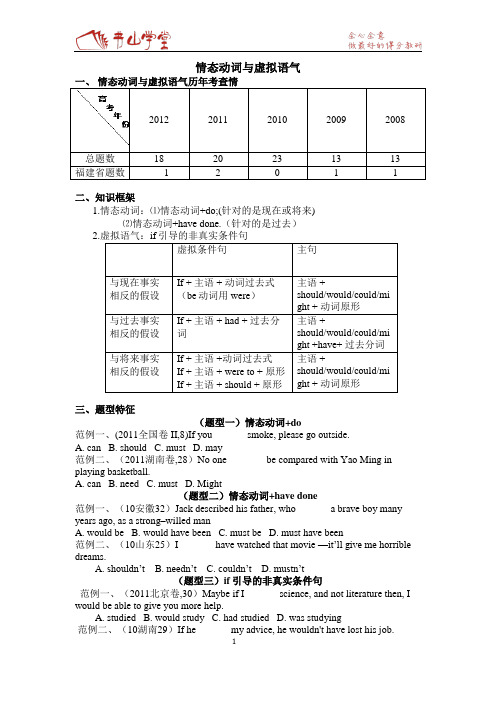
情态动词与虚拟语气总题数二、知识框架1.情态动词:⑴情态动词+do;(针对的是现在或将来)⑵情态动词+have done.(针对的是过去)2.三、题型特征(题型一)情态动词+do范例一、(2011全国卷II,8)If you ______ smoke, please go outside.A. canB. shouldC. mustD. may范例二、(2011湖南卷,28)No one _______ be compared with Yao Ming in playing basketball.A. canB. needC. mustD. Might(题型二)情态动词+have done范例一、(10安徽32)Jack described his father, who ______ a brave boy many years ago, as a strong–willed manA. would beB. would have beenC. must beD. must have been范例二、(10山东25)I_______ have watched that movie —it’ll give me horrible dreams.A. shouldn’tB. needn’tC. couldn’tD. mustn’t(题型三)if引导的非真实条件句范例一、(2011北京卷,30)Maybe if I ______ science, and notliterature then, I would be able to give you more help.A. studiedB. would studyC. had studiedD. was studying 范例二、(10湖南29)If he ______ my advice, he wouldn't have lost his job.A.followedB. should followC. had followedD. would follow四、解题步骤1、判断是考查从句还是主句;2、判断时态;3、判断是否考查虚拟语气(是否与过去现在和将来的事实相反)五、真题演练1. 【2012全国卷II】⒘I’m going to Europe on vacation together with John if I___ find the money.A. canB. mightC. wouldD. need2. 【2012重庆】25.-____you interrupt now? Can’t you see I’m on thephone?-Sorry Sir, but it’s urgent.A. CanB. ShouldC. MustD. Would3. 【2012全国】30. I _use a clock to wake me up because at sixo'clock each morning the train comes by my house.A. couldn'tB. mustn'tC. shouldn'tD. needn't4. 【2012北京】33. We ______ the difficulty together, but why didn’tyou tell me?A. should faceB. might faceC. could have facedD. must have faced5. 【2012福建】31. We lost our way in that small village, otherwisewe _____ more places of interest yesterday.A. visitedB. had visitedC. would visitD. would have visited6. 【2012陕西】17. If my car _____ more reliable, I would have drivento Lhasa instead of flying last summer.A. wasB. had beenC. should beD. would be7. 【2012陕西】23. I _______ thank you too much for all your help tomy son while we were away from home.A. won’tB. can’tC. canD. will8. 【2012山东】30. If we _____ adequate preparations, the conferencewouldn’t have been so successful.A. haven’t madeB. wouldn’t makeC. didn’t makeD. hadn’t made9. 【2012湖南】29. Sorry,I am too busy now. If I _____ time, I wouldcertainly go for an outing with you.A. have hadB. had hadC. haveD. had10. 【2012天津】8. It’s quite warm here; we _____ turn the heatingon yet.A. couldn’tB. mustn’tC. needn’tD. wouldn’t11. 【2012天津】15. We would have called a taxi yesterday if Harold______ us a ride home.didn’t offer B. wouldn’t offerC. hasn’t offeredD. hadn’t offered12. 【2012江西】22. We ____ have bought so much food now that Suziewon’t be with us for dinner.A. may notB. needn’tC. can’tD. mustn’t13. 【2012辽宁】24. One of our rules is that every student ____ wearschool uniform while at school.A. mightB. couldC. shallD. will14. 【2012辽宁】33. Jack is a great talker. It’s high time that he_____ something instead of just talking.A. will doB. has doneC. doD. did15. 【2012四川】19. I got close enough to hear them speaking Chinese,and I said ‚Ni Hao ‛ just as I ____ do in China.A. mustB. mightC. canD. should16. 【2012浙江】19. Had they known what was coming next, they _____second thoughts.A. may haveB. could haveC. must have hadD. might have had17. 【2012江苏】28. Days later, my brother called to say he was allright, but ____ say where he was.A. mustn’tB. shouldn’tC. wouldn’tD. mightn’t18. 【2012江苏】35. --Happy birthday!-- Thank you! It’s the bestpresent I _____ for.A. should have wishedB. must have wished.C. may have wishedD. could have wished19. They ______ have arrived at lunchtime but their flight wasdelayed.A.willB.canC.mustD.should20. (2011全国卷II,8)If you ______ smoke, please go outside.can B. should C. must D. May21. (2011北京卷,24)——I don’t really like James. Why did youinvite him?——Don’t worry. He ______ come. He said he wasn’t certain what his plans were.A. must notB. need notC. would notD. might not22. (2011北京卷,28)—Where are the children? The dinner’s going tobe completely ruined.—I wish they ______ always late.A. weren’t B . hadn’t been C. wouldn’t be D. wouldn’t have been23. (2011北京卷,30)Maybe if I ______ science, and not literaturethen, I would be able to give you more help.A. studiedB. would studyC. had studiedD. was studying24. (2011天津卷,15)I ______ sooner but I didn’t know that theywere waiting for me.had come B. was coming C. would come D. would have come25. (2011上海春招,27)Some young people these days just ______ goout of their homes to contact the real world.A. mustn’tB. won’tC. mightn’tD. shouldn’t26. (2011江苏卷,34)—I left my handbag on the train, but luckilysomeone gave it to a railway official.—How unbelievable to get it back! I mean, someone ______ it.A.will have stolenB. might have stolenC. should have stolenD. must have stolen27. (2011福建卷,25)——Shall I inform him of the change of theschedule right now?——I am afraid you ______, in case he comes late for the meeting .A.willB.mustC.mayD.can28. (2011福建卷,34)——Pity you missed the lecture on nuclearpollution.——I ______ it, but I was busy preparing for a job interview.A.attendedB.had attendedC.would attendD.would have attended29. (2011安徽卷, 26)—What do you think of store shopping in thefuture?—Personally, I think it will exist along with home shopping but_____.A. will never replaceB. would never replaceC. will never be replacedD. would never be replaced30. (2011浙江卷,11)—How’s your new babysitter?—We ______ ask for a better one. All our kids love her so much.A.shouldB.mightC. mustn‘tD. couldn’t31. (2011四川卷,20)The police still haven’t found th e lost child,but they’re doing all they ______.A.canB.mayC.mustD.should32. (2011重庆卷,25)—Why didn’t you come to Simon’s party lastnight?—— I wanted to ,but my mom simply ______ not let me out so late at night.A. couldB. mightC. wouldD. should33. (2011陕西卷,22)I _____ through that bitter period without yourgenerous help.A. couldn’t have goneB. didn’t goC. wouldn’t goD. hadn’t gone34. (2011陕西卷,24)—Will you read me a story ,Mummy?——OK. You ______ have one if you go to bed as soon as possible.A. mightB. mustC. couldD. shall35. (2011湖南卷,28)No one _______ be compared with Yao Ming inplaying basketball.A. canB. needC. mustD. might36. (2011辽宁卷,21)If you ______ go, at least wait until the storm isover.A. canB. mayC. mustD. will37. (2011江西卷23)It _______ be the postman at the door. It’s onlysix o’clock.A. mustn’tB.can’tC.won’tD.needn’t38. (2011江西卷28)We _____ John’s name on the race list yesterdaybut for his recent injury.A.will putB. will have putC. would putD. would have put39. (10安徽32)Jack described his father, who ______ a brave boymany years ago, as a strong–willed manA. would beB. would have beenC. must beD. must have been40. (10湖南23)You ______ buy a gift, but you can if you want to.A. mustB. mustn'tC. have toD. don't have to41. (10江西23)I have told you the truth. ______ I keep repeating it?A MustB CanC MayD Will42. (10山东25)I_______ have watched that movie —it’ll give mehorrible dreams.A. shouldn’tB. needn’tC. couldn’tD. mustn’t43. (10天津9)Mark ______ have hurried. After driving at top speed,he arrived half an hour early.A. needn’tB. wouldn’tC. mustn’tD. couldn’t44. (10四川3)— ______ I take the book out? —I'm afraid not.A. WillB. MayC. MustD. Need45. (10全国Ⅰ29)Just be patient .You ______ expect the world tochange so soon .A. can’tB. needn’tC. may notD. whether46. (10江苏25)—I haven’t got the reference book yet, but I’llhave a test on the subject next month.—Don’t worry. You______ have it by Friday.A. couldB. shallC. mustD. may47. (陕西 23)—May I take this book out of the reading room?—No, you ______. You read it in here.A. mightn’tB. won’tC. needn’tD. mustn’t48. (10全国Ⅱ17)I’m afraid Mr. Harding _________see you now. He’sbusy.A. can’tB. mustn’tC. shouldn’t D .needn’t49. (10辽宁26)Doctors say that exercise is important for health,but it _______ be regular exercise.A.can B.will C.must D.may50. (10北京23)---Good morning. I've got an appointment with MissSmith in the Personnel Department.--Ah, good morning. You ______ be Mrs. Peters.A. mightB. mustC. wouldD. can51. (10浙江17)You ______ have a wrong number,‛ she said.‚There’s no one of that name here.‛A. needB. canC. mustD. would52. (10上海29)---Sorry, Professor Smith. I didn't finish theassignment yesterday.---Oh, you ______ have done it as yesterday was the deadline.A. mustB. mustn'tC. shouldD. shouldn't53. (10安徽26)Bob would have helped us yesterday, but he _____.A. was busyB. is busyC. had been busy.D. will be busy54. (10湖南29)If he ______ my advice, he wouldn't have lost his job.A. followedB. should followC. had followedD. would follow55. (10天津15)John went to the hospital alone. If he ______ meabout it, I would have gone with him.A. should tellB. tellsC. toldD. had told56. (10江苏34)George is going to talk about the geography of hiscountry, but I’d rather he ______ more on its culture.A. focusB. focusedC. would focusD. had focused57. (陕西15)If we ______ the other road, we might have arrived herein time for the meeting.A. takeB. had takenC. tookD. have taken58. (10北京34)--The weather has been very hot and dry.--Yes. If it had rained even a drop, things would be much better now! And my vegetables ______ .A. wouldn't dieB. didn't dieC. hadn't diedD. wouldn't have died59. (10浙江10)Had I known about this computer program, a hugeamount of time and energy ______.A.would have been saved B.had been savedC.will be saved D.was saved60. (09安徽29)Some people who don’t like to talk much are notnecessarily shy;they ______ just be quiet people.A. mustB. mayC. shouldD. would61. (09北京25)One of the few things you ______ say about Englishpeople with certainty is that they talk a lot about the weather.A. needB. mustC. shouldD. can62. (09福建35)But for the help of my English teacher, I ______ thefirst prize in the English Writing Competition.A. would not winB. would not have wonC. would winD. would have won63. (09湖南30)—It’s the office! So you ______ know eating is notallowed here.— Oh, sorry.A. mustB. willC. mayD. need64. (09海南25)What do you mean, there are only ten tickets? There______ be twelveA. shouldB. wouldC. willD. shall65. (09上海27)It _____ have been Tom that parked the car here, as heis the only one with a car.A. mayB. canC. mustD. should66. (09四川13)—I don’t care what people think.—Well, you _______A. couldB. would C . should D. might67. (09天津15)This printer is of good quality. If it _______ breakdown within the first year, we would repair it at our expense.A. wouldB. shouldC. couldD. might68. (09重庆32)—Hi, Tom. Any idea where Jane is?—She _____ in the classroom. I saw her there just now.A. shall beB. should have beenC. must beD. might have been69. (09全国Ⅱ20)I can’t leave. She told me that I ______ stay here until she comesback.A. canB. mustC. willD. may70. (09江苏28)He did not regret saying what he did but felt that he______ it differently.A. could expressB. would expressC. could have expressedD. must have expressed71. (08全国Ⅱ17)Liza ______ well not want to go on the trip—she hatestraveling.A.willB.canC.mustD.may72. (08北京21)John promised his doctor he ______ not smoke, and hehas never smoked ever since.A.mightB.shouldC.couldD.would73. (08天津6)She ______ have left school, for her bike is still here.A.can’tB.wouldn’tC.shouldn’tD.needn’t74. (08江西26)What a pity!Considering his ability and experience, he______ better.A.need have doneB.must have doneC.can have doneD.might have done75. (08湖南28)You don’t have to know the name of the author to finda book.You ______ find the book by the title.A.mustB.needC.canD.would76. (08陕西9)—What sort of house do you want to have? Something big? —Well, it ______ be big—that’s not important.A.mustn’tB.needn’tC.can’tD.won’t77. (08四川10)Although this ______ sound like a simple task,greatcare is needed.A.mustB.mayC.shallD.should78. (08重庆30)—I can’t find my purse anywhere.—You ______ have lost it while shopping.A.mayB.canC.shouldD.would79. (08浙江11)You ______ be hungry already— you had lunch only twohours ago!A.wouldn’tB.can’tC.mustn’tD.needn’t80. (08福建24)It is usually warm in my hometown in March,but it______ be rather cold sometimes.A.mustB.can C .should D.would81. (08辽宁22)Peter ______ be really difficult at times even thoughhe’s a nice person in general.A.shallB.shouldC.canD.must82. (08江苏35)—I’m sorry.I ______ at you the other day.—Forget it.I was a bit out of control myself.A.shouldn’t shoutB.shouldn’t have shoutedC.mustn’t shoutD.mustn’t have shouted83. (08山东24)Thank you for all your hard wo rk last week.I don’tthink we ______ it without you.A.can manageB.could have managedC.could manageD.can have managed。
高考英语考点之情态动词和虚拟语气
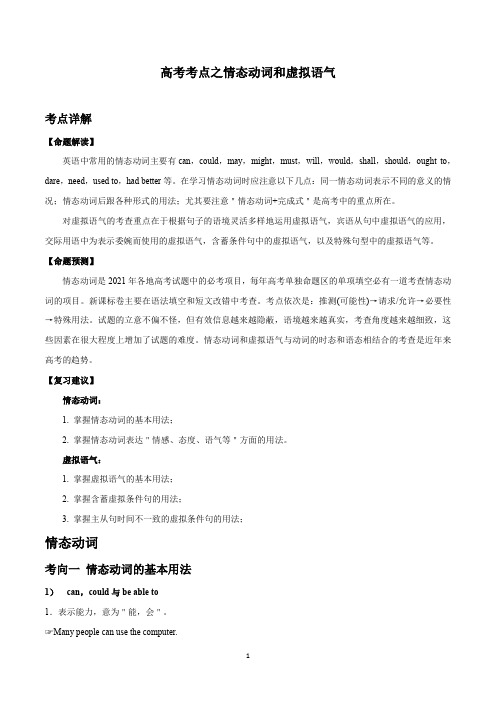
高考考点之情态动词和虚拟语气考点详解【命题解读】英语中常用的情态动词主要有can,could,may,might,must,will,would,shall,should,ought to,dare,need,used to,had better等。
在学习情态动词时应注意以下几点:同一情态动词表示不同的意义的情况;情态动词后跟各种形式的用法;尤其要注意"情态动词+完成式"是高考中的重点所在。
对虚拟语气的考查重点在于根据句子的语境灵活多样地运用虚拟语气,宾语从句中虚拟语气的应用,交际用语中为表示委婉而使用的虚拟语气,含蓄条件句中的虚拟语气,以及特殊句型中的虚拟语气等。
【命题预测】情态动词是2021年各地高考试题中的必考项目,每年高考单独命题区的单项填空必有一道考查情态动词的项目。
新课标卷主要在语法填空和短文改错中考查。
考点依次是:推测(可能性)→请求/允许→必要性→特殊用法。
试题的立意不偏不怪,但有效信息越来越隐蔽,语境越来越真实,考查角度越来越细致,这些因素在很大程度上增加了试题的难度。
情态动词和虚拟语气与动词的时态和语态相结合的考查是近年来高考的趋势。
【复习建议】情态动词:1. 掌握情态动词的基本用法;2. 掌握情态动词表达"情感、态度、语气等"方面的用法。
虚拟语气:1. 掌握虚拟语气的基本用法;2. 掌握含蓄虚拟条件句的用法;3. 掌握主从句时间不一致的虚拟条件句的用法;情态动词考向一情态动词的基本用法1)can,could与be able to1.表示能力,意为"能,会"。
☞Many people can use the computer.许多人会用电脑。
☞If you have a good sleep,you will be able to work out this problem.如果你好好睡一觉,你将能够解出这道题。
☞I could have worked out the problem,but I was too nervous.我本来可以解决这个问题,但我太紧张了。
高三英语高考语法知识点归纳总结情态动词和虚拟语气 情态动词

will/would
请求、建议,would比will委婉客气。
Would you pass me the book?
表示意志、愿望和决心。
I will never do that again.
They asked us if we would do that again
Mary is in poor health. She can be ill at any times.
在否只能用can和may。所以can’t时用以代替mustn’t,语气比may更肯。中文可以翻译为不可能。
Michael______be a policeman, for he’s much too short.
couldn’t do
may
可以(问表示请求)
可能,或许(表推测)
祝愿(用于倒装)
may not do
May…do…?
Yes,…may.
No,…mustn’t/can’t.
might
might not do
Might…do…?
Yes,…might
No,…might not.
must
必须,该(表主观要求)
①—Could I call you by your first name?—Yes, you______
A.will B.couldC.mayD.might
②Johnny, you_____play with the knife, you_____hurt yourself.
A.won’t/can’tB.mustn’t/may
You shall fail if you don’t work harder.警告
第03讲情态动词和虚拟语气(精讲)2024年高考英语高频考点题型归纳与方法总结(新高考通用)

【一轮复习讲义】2024年高考英语高频考点题型归纳与方法总结(新高考通用)第03讲情态动词和虚拟语气(精讲)题型目录一览考点1、情态动词的用法分考点1. 情态动词的基本用法(1)、can, could①、表示能力,意为“能,会”;could表示过去的能力,不表示是否做。
·●She can speak French fluently. 她能讲一口流利的法语。
●Our daughter could walk when she was nine old. 我们的女儿九个月大时就会走路了。
②、can可用于肯定句中,表示客观或理论上的可能性。
● He is confident a solution can be found. 他确信会找到解决办法。
●An experienced teacher can make mistakes. 一位有经验的老师也会犯错。
③、表示请求或允许。
在疑问句中, could可以代替can,语气更委婉,但回答时要用can。
●---Can/ Could I use your bike tomorrow morning?----Yes, you can.---明天上午我可以用你的自行车吗?----是的,可以。
①、表示可能性,意为“可能”,can多用于否定句和疑问句中,could不受限。
can比could语气强。
●He can't be our manager. Our manager has gone to Beijing..他不可能是我们经理。
我们经理已经去北京了。
⑤、表示惊异、怀疑、迷惑等态度,常用于否定句和疑问句中。
● How can you treat me like that? 你怎么能那样对我?⑥、用于固定习语中:can't....too/ enough(无论…也不过分;越…越好);can' but do sth..(不得不做某事,只好做某事);can' t help doing sth...(禁不住做某事)。
情态动词与虚拟语气详解(附练习和解析)
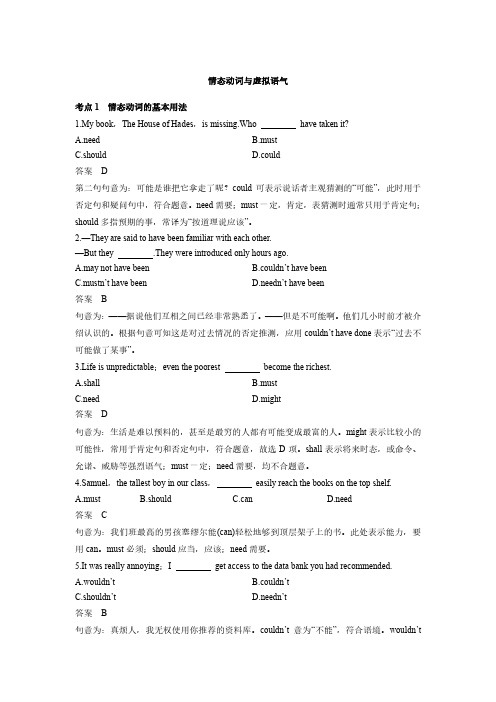
情态动词与虚拟语气考点1情态动词的基本用法1.My book,The House of Hades,is missing.Who have taken it?A.needB.mustC.shouldD.could答案 D第二句句意为:可能是谁把它拿走了呢?could可表示说话者主观猜测的“可能”,此时用于否定句和疑问句中,符合题意。
need需要;must一定,肯定,表猜测时通常只用于肯定句;should多指预期的事,常译为“按道理说应该”。
2.—They are said to have been familiar with each other.—But they .They were introduced only hours ago.A.may not have beenB.couldn’t have beenC.mustn’t have beenD.needn’t have been答案 B句意为:——据说他们互相之间已经非常熟悉了。
——但是不可能啊。
他们几小时前才被介绍认识的。
根据句意可知这是对过去情况的否定推测,应用couldn’t have done表示“过去不可能做了某事”。
3.Life is unpredictable;even the poorest become the richest.A.shallB.mustC.needD.might答案 D句意为:生活是难以预料的,甚至是最穷的人都有可能变成最富的人。
might表示比较小的可能性,常用于肯定句和否定句中,符合题意,故选D项。
shall表示将来时态,或命令、允诺、威胁等强烈语气;must一定;need需要,均不合题意。
4.Samuel,the tallest boy in our class,easily reach the books on the top shelf.A.mustB.shouldC.canD.need答案 C句意为:我们班最高的男孩塞缪尔能(can)轻松地够到顶层架子上的书。
2023年高三英语复习核心知识点情态动词和虚拟语气

情态动词和虚拟语气一、问:本考点旳命题思绪是什么?答:情态动词要注意如下3个方面:1、重视在语言环境中根听说话人旳语气来使用情态动词。
2、情态动词表达推测或判断旳使用方法考察。
3、设置场景考察学生纯熟使用表达责怪等旳情态动词加完毕时旳使用方法等。
虚拟语气是历年高考旳选考考点。
考点常集中在含蓄条件句以及宾语从句中旳虚拟语气上。
所设选项常通过谓语动词旳特殊形式来表达,并且都是结合详细语境来考察对考点旳运用能力。
此后高考对虚拟语气旳命题重点仍会是在特定语境中考察虚拟语气中旳含蓄虚拟条件句、宾语从句中旳谓语动词等。
例1:(08上海卷). According to the air traffic rules, you ___ switch off your mobile phone before boarding.A. mayB. canC. wouldD. should【答案】D。
【题源探究】考察should旳基本使用方法。
【广角思维】句意为“根据航空交通法,有在登机前应当把手机关掉。
”should“应当”符合该句语境因此答案为D。
【易误警示】不能精确地把握该提旳语境是考生在做该题时出现旳重要错误。
做此类试题时一定要通过语境把握准语境体现出来旳说话人旳语气和态度。
【悟彻高考】should旳其中一种重要使用方法是:should 作为情态动词,一般用来表达目前或未来旳责任或义务,译作“应当”、“应当”,这时它可以和ought to,be supposed to 互换使用。
例如:You should (= are supposed to )complete your test in time.你们应当准时做完你们旳试验。
You should (= ought to )tell your mother about it at once.【同类预测】对should旳这种使用方法旳考察会比较灵活,也比较常见,有时会运用ought to 来考察该使用方法。
高中英语2025届高考语法复习情态动词与虚拟语气知识讲解
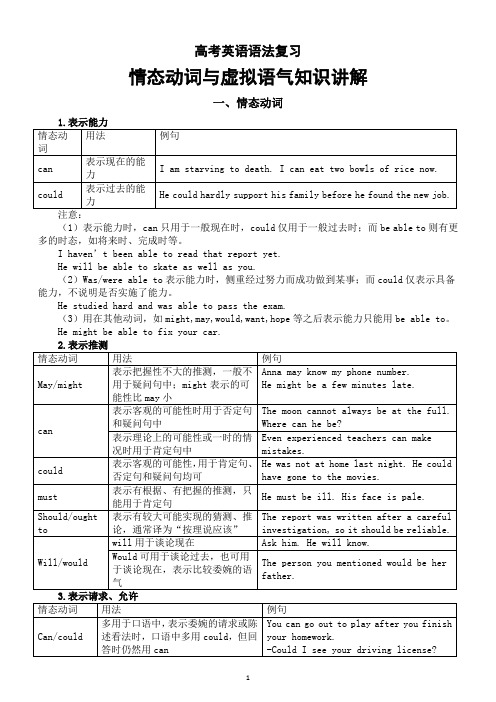
高考英语语法复习情态动词与虚拟语气知识讲解一、情态动词(1)表示能力时,can只用于一般现在时,could仅用于一般过去时;而be able to则有更多的时态,如将来时、完成时等。
I haven’t been able to read that report yet.He will be able to skate as well as you.(2)Was/were able to表示能力时,侧重经过努力而成功做到某事;而could仅表示具备能力,不说明是否实施了能力。
He studied hard and was able to pass the exam.(3)用在其他动词,如might,may,would,want,hope等之后表示能力只能用be able to。
He might be able to fix your car.(1)must还可以表示质问或感情色彩,意为“偏要,偏偏”。
Why must it snow on Saturday?(2)should还可以表示惊奇、愤怒、失望等特殊情感,尤其用在以why,who,how等开头的疑问句中或某些感叹句中。
why should you be so late today?(1)must作“必须”讲的一般疑问句,其肯定回答用must,否定回答用needn’t或don’t have to。
-Must I pay now?-Yes, you must./No, you needn’t.(2)need还可以作实义动词,有人称和数的变化,后跟带to的不定式作宾语。
She needed to go out for a walk.(1)两者在表示过去的习惯动作或行为时常可通用。
When we were children, we would/used to go skating every winter.(2)Used to与would都不能与表示具体频率、次数的词及特定的时间状语或具体的一段时间连用。
高考英语之情态动词用法和虚拟语气知识点和范例
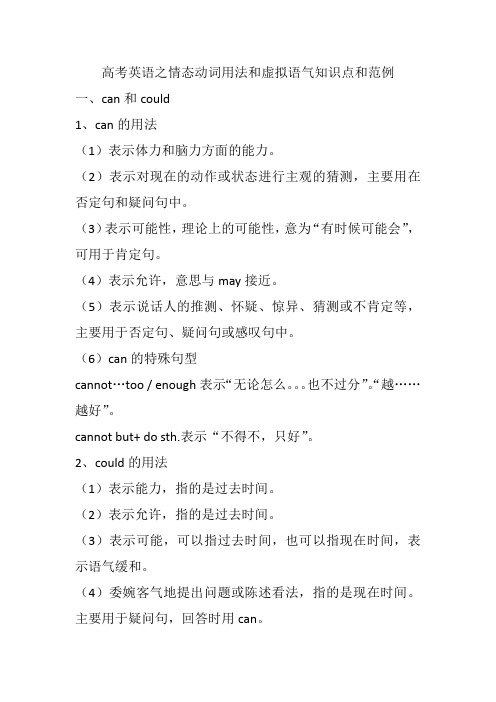
高考英语之情态动词用法和虚拟语气知识点和范例一、can和could1、can的用法(1)表示体力和脑力方面的能力。
(2)表示对现在的动作或状态进行主观的猜测,主要用在否定句和疑问句中。
(3)表示可能性,理论上的可能性,意为“有时候可能会”,可用于肯定句。
(4)表示允许,意思与may接近。
(5)表示说话人的推测、怀疑、惊异、猜测或不肯定等,主要用于否定句、疑问句或感叹句中。
(6)can的特殊句型cannot…too / enough表示“无论怎么。
也不过分”。
“越……越好”。
cannot but+ do sth.表示“不得不,只好”。
2、could的用法(1)表示能力,指的是过去时间。
(2)表示允许,指的是过去时间。
(3)表示可能,可以指过去时间,也可以指现在时间,表示语气缓和。
(4)委婉客气地提出问题或陈述看法,指的是现在时间。
主要用于疑问句,回答时用can。
3、can与could的区别can表推测时只用于否定句和疑问句(could无此限制)。
couldn't的可能性比can't小。
4、can与be able to的区别(1)现在时:无区别,但后者不常用。
(2)完成时;can没有完成时,此时要用have(has,had)been able to。
(3)将来时:can没有将来时,要用will be able to。
(4)过去时:could表示一般能力,was/were able to 表示在具体场合通过努力成功做成某事的能力。
二、may 和might1、may的用法(1)表示询问或说明一件事可不可以做。
(2)表示一件事或许会发生或某种情况可能会存在,通常用在肯定句和否定句中。
注意:表示可能性时,can't语气强,表示“不可能”,may not 语气弱,表示“可能不”。
2、might的用法(1)表示询问或允许,指的是过去时间。
(2)表示可能发生的事,可以指过去时间,也可以指现在时间,语气更加不肯定,可能性比may小一些。
- 1、下载文档前请自行甄别文档内容的完整性,平台不提供额外的编辑、内容补充、找答案等附加服务。
- 2、"仅部分预览"的文档,不可在线预览部分如存在完整性等问题,可反馈申请退款(可完整预览的文档不适用该条件!)。
- 3、如文档侵犯您的权益,请联系客服反馈,我们会尽快为您处理(人工客服工作时间:9:00-18:30)。
情态动词与虚拟语气常考考点一情态动词+have done 情态动词+have done 表示对过去的虚拟1.I have watched that movie it’ll give me horribledreams.A.Shouldn’tB.needn’tC.couldn’tD.mustn’t2.Mark have hurried. After driving at top speed, he arrived halfan hour early.A.needn’tB.wouldn’tC.mustn’tD.couldn’t3.----Sorry, Professor Smith. I didn’t finish the assignment yesterday. -----Oh, you have done it as yesterday was the deadline.A.mustB.mustn’tC.shouldD.shouldn’t4.It have been Tom that parked the car here, as he is the only one with a car.A.mayB.canC.mustD.should5. He didn’t regret saying what he did but felt that he it differently.A.could expressB. would expressC.could have expressedD.must have expressed6. -----I’m sorry. I at you the other day.------Forget it, I was a bit out of control myself.C.mustn’t shoutD.mustn’t have shouted7.-----Where is my dictionary? I remember I put it here yesterday.-------You it in the wrong place.A.must putB. should have putC.might putD.might have put8. The weather turned out to be fine yesterday, I the trouble to carry my umbrella with me.A.should have takenB.could have takenC.needn’t have takenD. mustn’t have taken9. As you worked late yesterday, you have come this morning.A.mayn’tB.can’tC.mustn’tD.needn’t10.-----How did you do on the driving test?---------Not so well. I much better, but I was too nervous.A.would doB.could have doneC.mustn’t have doneD. should do11.you have broken your promise; You painting the house long ago.A. could have finishedB. had better finishC. must have finishedD.should have finished12.------ I didn’t go fishing last Sunday because my car broke down.---------- you mine. I wasn’t using it.A.should borrowB. could have borrowedC.could borrowD.must have borrowed13. My newly-purchased magazine is nowhere to be found. I have left it on the train?A.CouldB. ShouldC.MustD.Would14. You the meeting to tell me that .you could have come up to me afterwards.A.should have come toB.needn’t have interruptedC.ought to attendD.mustn’t go to15. -----What are you doing, dear?-------I’m watching the football game.-------What? You your homework first.A.would have doneB.must have doneC.should have doneD. may have done二.情态动词常考情况1.can 表客观存在的可能如:Accidents can happen on such rainy days.Driving on the highway can be dangerous2.shall 可以表示命令,警告,威胁,许诺,宣布法律规定时也要用shall.You shall leave the room at once.It has been announced that candidates shall remain in their seats until all the papers have been collected.He asked me for this book many times. Please tell him he shall have it tomorrow.My father told me, “You shall have a computer on your 18th birthday.”3.May well 与may as wellmay well + 动词原形,表示很可能He may well be proud of his son.Her appearance has changed so much that you may well not recognize her.may as well+动词原形,表示“最好,满可以,倒不如”You may as well do it at once.We may as well stay where we are.4.must 表示偏要,硬要Must you make so much noise?If you must smoke, please go out.情态动词基本用法练习1.It is usually warm in my hometown in march, but it be rather cold sometimesA. mustB.canC.shouldD.would2.Peter be really difficult at times even though he’s a nice person in general.A. shallB.shouldC.canD.must3.Don’t let your head out of a moving bus, which lead to a terrible disaster.A.canB.shouldC.mustD.will4. -----Can I pay the bill by check?--------Sorry,sir. But it is the management rules of our hotel that payment be made in cash.cation5.----- What does the sign over there read?-------- “No person smoke or carry a cigarette, cigar or pipe in this area.”A.WillB. mayC. shallD. must6.------I haven’t got the reference book yet, but I’ll have a test on the subject next month.-------Don’t worry, you have it by Friday.A.CouldB.shallC.mustD.may7. Being examed twice a year, whether it is a car or a bus or a truck, is the rule that every driver obey in this city.A.shallB.canC.ought toD.need8.-----Mum, would you please buy me an MP5 player?----If you can help do some housework the whole vacation, you have one as a reward.A.mustB. needC.would D . shall9. It is a set rule that all payment be made by the end of the month.A.willB. shallC. canD. may10.Lisa well not want to go on the trip. She hates travelling.A.willB. canC.mustD.may11. ------The work will take me another week. I’m really tired.-------I think you as well consult an experienced worker.A.mayB.canC.needD.must12. If you talk about it with me, please wait till I finish mywork at hand.A. canB. mayC. mustD. should13. Nick, stop screaming like crasy! Why you watch thatstupid football match at one in the morning?A. shallB. wouldC. shouldD. must14. If you go, at least wait until the storm is over.A. canB. mayC. mustD. will15.-----May I smoke here?-------If you , choose a seat in the smoking section.A.ShouldB. couldC.mayD.must16. -------Why didn’t you come to Simon’s party last night?-------I wanted to, but my mum simply not let me out solate at night.A.couldB.mightC. wouldD. should17. ------Are you going to the lecture tomorrow afternoon?-------I’m not sure now. I go to Professor Black’s class instead.A.mightB. wouldC. shouldD. must18. ----- I book a table for dinner a few dsays ahead of time?------- Yes, you . The restaurant is always full, especially during the holidays.A.Must; willB. Must; canC. shall; shallD. shall; must19. You can’t imagine that a well-behaved gentleman be sorude to a lady.A. mightB.needC. shouldD. would20. My MP4 isn’t in my bag. Where I have put it?A. canB. mustC.shouldD. would三. 虚拟语气主从句时态练习1------John went to the hospital alone.-------If he me about it, I would have gone with him.A.should tellB. tellsC. toldD. had told2.------The weather has been very hot and dry.-------Yes. If it had rained even a drop, things would be much better now! And my vegetables .A.wouldn’t dieB. didn’t dieC. hadn’t diedD. wouldn’thave died3.If we the other road, might have arrived here in time for the meeting.A. takeB. had takenC. tookD. have taken4. Had I known about this computer program, a huge amount of time and energy .A. would have been savedB. had been savedC. will be savedD. was saved5. If he my advice, he wouldn’t have lost his job.A.followedB. should followC. had followedD. would follow6. be fired, your health care and other benefits wouldn’t beimmediately cut off.A would you be B. Should you be C. Could you be D. Might you be7. If English included in the examinations, few students would choose it.A. weren’tB. isn’tC. hasn’t beenD. hadn’t been8. ----Mike , It’s a pity you didn’t come to last night’s concert. It was really great!-------Really? If I so busy, I would have gone with you.A.hadn’t beenB. weren’tC. shouldn’t beD. wouldn’tbe9. it to rain tomorrow, the sports meeting would be put off until the same time next week.A.Should ; /B. If ; shouldC. Were; /D. If; weregoing10. for the fact that she got hit by a car and broke her leg on her way to school, she might have passed the exam.A. Had it not beenB. Hadn’t it beenC. Was it notD. Were it not把下列句子变成省略if 的形式1.If he had told me about it, I would have gone with him.2.If it had rained even a drop, things would be much better.3.If we had taken the other road, we might have arrived here intime.4.If it should rain tomorrow, I wouldn’t go hiking.5.If he were a bird, he would fly in the sky happily四. 介词短语中的虚拟语气用介词短语代替条件句,常见的介词有:,without, but foreg:Without your help, we couldn’t have finished the work ahead of time.=But for your help, we couldn’t have finished the work ahead of time.=Had it not been for your help, I couldn’t have finished the work ahead of time.练习1.T hank you for all your hard work last week, I don’t think weIt without you.A.can manageB.could have managedC.could manageD.can have managed2.But for our help ,we the program in time.A. can not finishB. will not finishC. had not finishedD. could not have finished3.But for the help of my Eglish teacher, I the first prize in the English writing competition.A. would not winB. would not have wonC.would winD.would have won4. the English examination I would have gone to the concert last Sunday.A.In spite ofB. But forC. Because ofD.As for5.Without electronic computers, much of today’s advanced technologyA. will not have been achievedB. have not been achievedC. would not have been achievedD.had not been achieved四.错综时间条件句, 动词形式根据它所表示的时间做出相应的调整eg: If you had followed my advice just now, you would be better now.If you had studied hard before, you would be a college student now.1.If you had caught the early bus, you late now.A.Wouldn’t beB. won’t bec.wouldn’t have been D. aren’t2. If you had found a good job then, you trouble buying the house now.A. won’t haveB. wouldn’t haveC. wouldn’t hadD. didn’t have3. Maybe if I science, and not literature then, I would be able to give you more help.A. studiedB. would studyC. had studiedD. was studying4. “ If you to my party yesterday, you the reason why Iam wearing the clothes now.” Helen said to me.A.came; had knownB.had come ; would knowC. had come; would have knownD. came; would know五. 含蓄条件句例如I would have come, but I was ill that day.I was ill that day, or I would have come.练习1.I you more help, but I was too busy.A.should have givenB. gaveC.will giveD. should give2. I went on business that day. Otherwise, I you solve the problem.A. would helpB. helpedC. would have helpedD. was helping3. I didn’t know you were ill, or I to the hospital to see you.A. would goB. would have goneC. have goneD. went4. I sooner but I didn’t know that they were waiting for you.A.had comeB. was comingC. would comeD. would have come5.I had to look after my mother in the hospital.Otherwise,I part in your birthday party.A. would takeB. did takeC. had takenD. would have taken六.表示建议,要求,命令等词(如suggest,propose,advice,require,request,demand, recommend, order,command,insist)后的从句中,虚拟语气结构为should+ 动词原形,should可以省略.当suggest 表示“表明”, insist 表示“坚持说过去发生过某事”时不属于这种用法.eg: He suggested that we (should ) start off early the next day.It’s suggestesd that the meeting (should ) be put off till next week.We all agreed to his suggestion that we (should ) go to DaLian for sightseeing.My suggestion is that we (should ) put off the meeting.练习1.Teachers recommend parents their children under 12 to ride bicycles to school for safety.A. not allowB. do not allowC. mustn’t allowD. couldn’t allow2. The doctor recommended that you swim after eating a large meal.A. wouldn’tB.couldn’tC.needn’tD. shouldn’t3.The boss required that the plans before April.A. turn in B turned in C. be turned in D. turning in4.The general ordered that the soldiers toward the mountain.A. marchedB. be marchedC. marchD.marching5.He had a proposal that the meetingA.put offB. be put offC. putting offD. would be put off七.as if, as though,would rather, if only,wish 后面常接虚拟语气. It’s necessary/important/strange/natural/essential后面从句动词常用(should)+do. It’s (high) time that sb. Did sth./sb.should do sth.eg: He looks as if he were an artist.I would rather I were a bird.If only I were a bird.I wish I were a bird.It’s (high time) that you went to school.It’s (high) time that we should start out.1.Gorge is going to talk about the geography of his country, but I’drather he more on its culture.A.FocusB.focusedC.will focusD. had focused2.------Where are the children? The dinner is going to be completelyruined.-------I wish they always late.A.Weren’tB. hadn’t beenC. wouldn’t beD.wouldn’t have been3.It’s strange that they nothing about this matter.A.should knowB.would knowC.had knownD.knew4.How I wish I to my parent’s advice.A.listeningB. listenC. am listeningD. had listened5.Look at the terrible situation I am in! If only I your advice.A. followB. would followC.had followedD. followed6. He speaks Chinese as fluently as if he a Chinese.A. wereB.had beenC. isD. has been7. Looking round the town, he felt as though he away for ages.A. has beenB. wasC. isD. had been。
